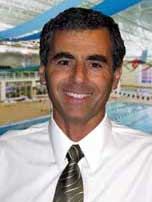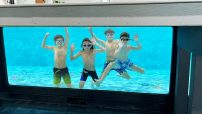Most aquatics professionals will tell you one of the biggest issues facing the industry is the lack of available education. That’s where Alex Antoniou, Ph.D., comes in. “I’m always trying to ask myself, ‘What else can we do? Where is there a gap in the industry that we need to fill, from an educational standpoint?’” says Antoniou, director of educational services at the National Swimming Pool Foundation in Colorado Springs, Colo.
As such, Antoniou is the gate keeper of one of the most recognized pool and spa operator programs available. He administers all of the foundation’s educational tracks for public health officials, pool operators and builders. He’s also a mastermind behind NSPF’s recent success, the Certified Pool Inspector program, which health departments such as New York’s are quickly adopting.
To say Antoniou is qualified for his position is an understatement. He’s certified in 21 areas of aquatics — everything from lifeguarding and CPR to scuba training and small boat sailing.
He was first introduced to aquatics during college, while finishing his undergraduate degree in education. Between semesters, he’d hop the pond from England to New Jersey to work as a lifeguard at a YMCA summer camp. Meanwhile, he was busy accumulating every relevant certification he could. In 1992, he became director of the Rutgers University aquatics program, which was almost nonexistent at the time. When he left 11 years later, the learn-to-swim program went from averaging 20 kids per session to 700. His efforts earned Rutgers various accolades, including two from Aquatics International for in-service training and emergency action plan.
By the end of his tenure with the university, he was ready to make another big change. At the time, Antoniou had already been involved with NSPF as a CPO instructor and member of the educational training committee. While still at Rutgers, he had also begun developing CPI for the foundation. Eventually, NSPF CEO Thomas Lachocki approached Antoniou about a new position that the foundation was creating.
“When I heard of the position at the foundation, I thought, ‘Wow. Here’s an opportunity to do something in the aquatics industry that has implications on a national and perhaps international level,” Antoniou recalls.
International, indeed. Last year saw the launch of the Spanish-language version of the Certified Pool and Spa Operator Handbook, and he recently introduced CPO to Spain. He also plans to launch a number of online training modules to supplement the CPO program, such as hazmat and blood-borne pathogen training — OSHA-required qualifications that many pool operators need. “We need to address training at a national level, even if we have to do it one state at a time,” he says. He points to the recent rash of large outbreaks, such as last year’s cryptosporidium outbreak that affected nearly 4,000 visitors at a spraypark in New York.
“The industry is growing in leaps and bounds,” he continues. “We’re getting more pools, more spas and more people using those facilities. We need to make sure the operators in charge of those facilities have the best possible training to ensure the health and safety of the public.” — Joshua Keim



